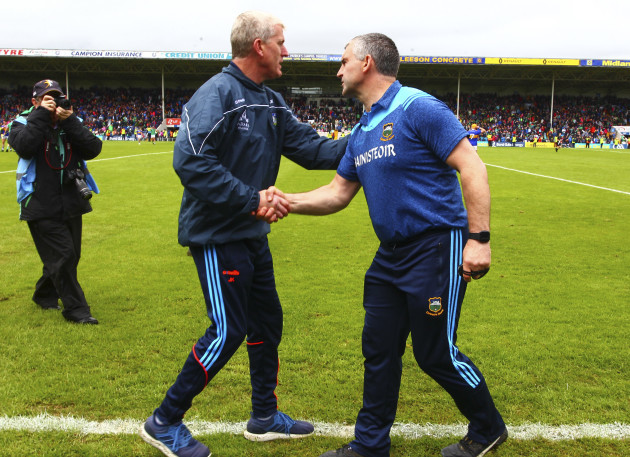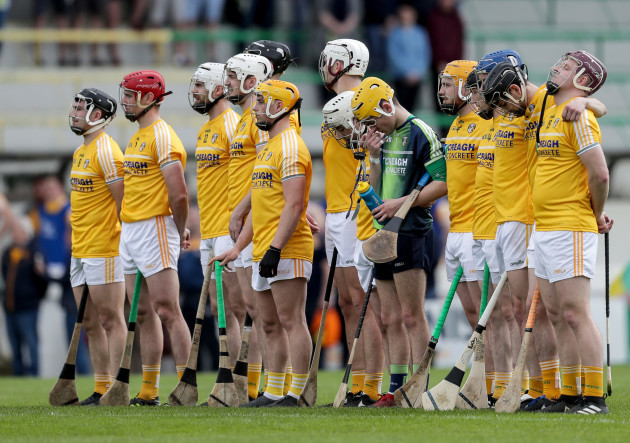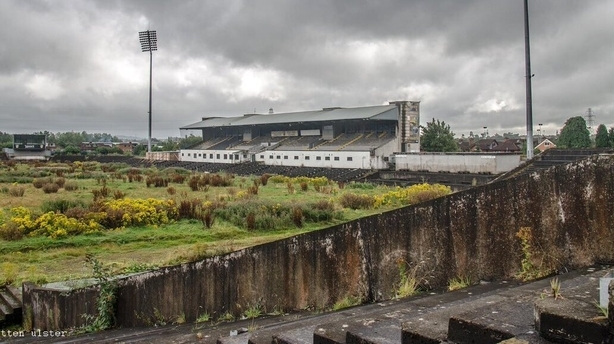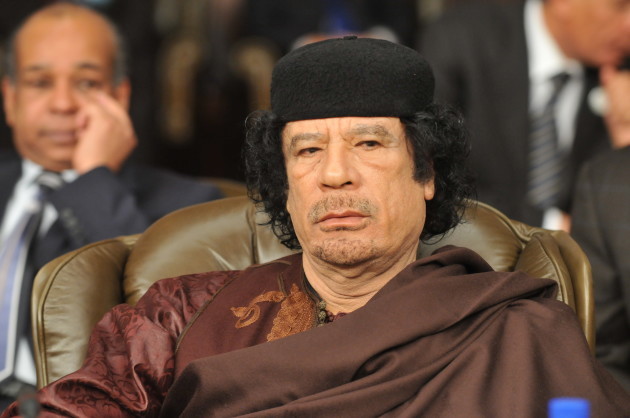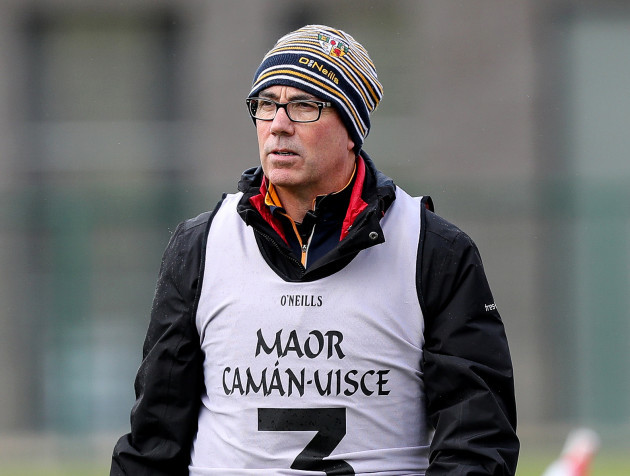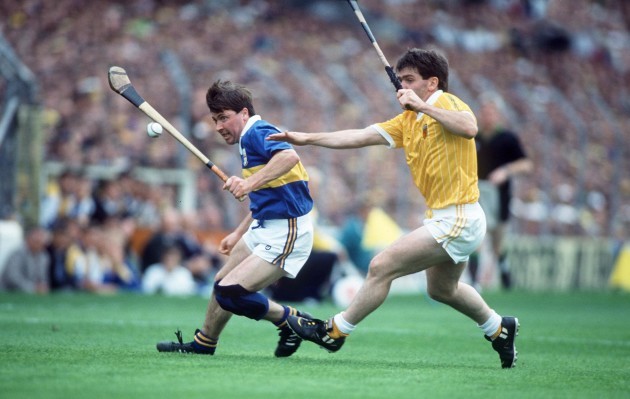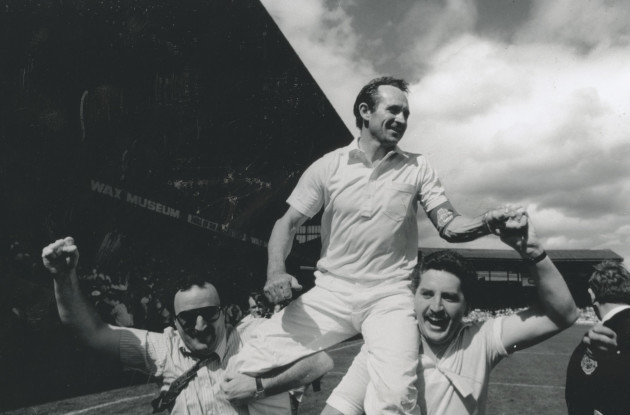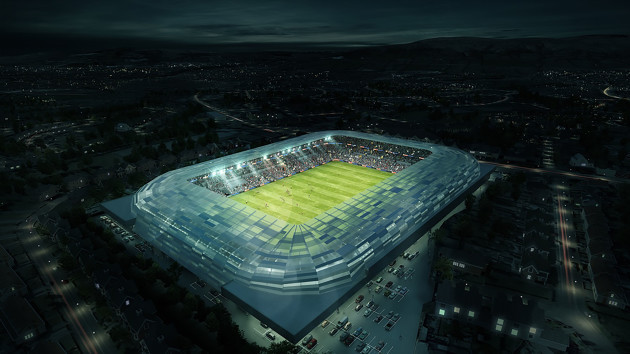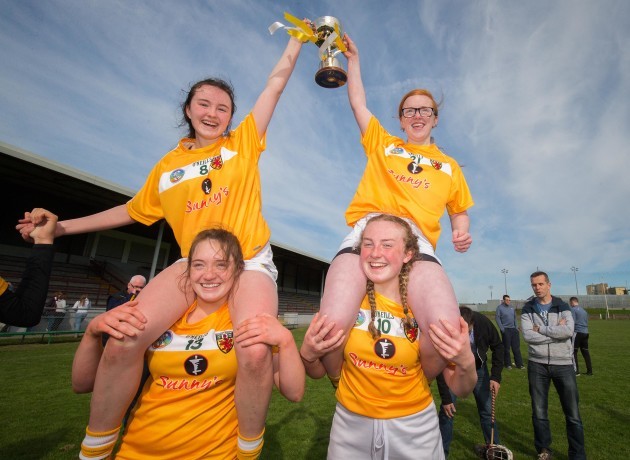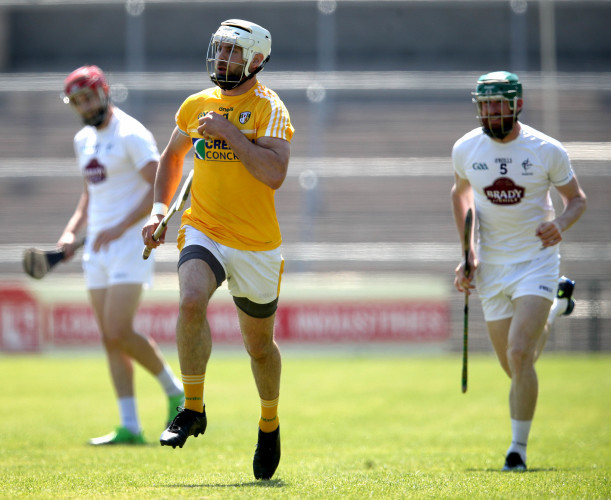LAST UPDATE | 29 Jun 2019
THERE ARE THREE big inter-county hurling games taking place this weekend: the Munster, Leinster and Joe McDonagh Cup finals.
Interested neutrals will only be able to enjoy 15 minutes or so of the McDonagh Cup decider on TG4′s Youtube channel before the Munster final between Tipperary and Limerick throws-in at 2pm.
In reality, only supporters from Laois and Westmeath will tune into coverage of the second tier final as the nation’s focus turns to the main event in the southern province.
The scheduling highlights the lip service the GAA have paid to the McDonagh Cup that has greatly frustrated players, managers and fans of the counties involved.
Whichever side wins on Sunday, they’ll have little chance to celebrate as they face an All-Ireland preliminary quarter-final the following weekend against Dublin. The losers face an even tougher task to drag themselves off the floor in time for a meeting with Cork.
The short turnaround and lack of coverage is even more galling when you consider last weekend was free of top tier hurling action.
“The competition is excellent but it’s not getting good press and coverage – all those things are very disappointing,” Antrim manager Neal Peden tells The42.
“A lot of people going to the matches are saying that they really are excellent matches and the standard of hurling is excellent in the games.”
Antrim finished third in the McDonagh Cup round-robin, one point off finalists Westmeath. Whichever county manages to seal promotion to the 2020 Leinster championship this weekend will do so in the knowledge that – in all likelihood – they’ll be competing in the McDonagh Cup again by 2021.
The growing divide between the rich and the poor is a great frustration for counties like Antrim, who are desperately trying to rejoin hurling’s top table. Their hands are tied by the system.
“You want to be a team that’s going to try and stand up there and hold your ground for a couple of years,” says Peden. “Carlow is a prime example of that.
“They’ve held their own status in Division 1B, yet they’re the bottom team in Leinster and they’re getting relegated. Whereas Waterford are bottom of Munster and they’re not relegated.
There is an unfairness there, there’s no question about it. They need to get the balance, Munster can’t hold the high ground and then Leinster are getting Galway to come in and play which is a great thing, we were in Leinster for a while.
“Leinster have opened their doors to try and make progression, I think Munster have to follow that and the GAA has to recognise there has to be a fairness in that.
“People don’t like talking about money, nobody does. But finance is so important to make progress.”
Peden is well-placed to speak about the challenges facing Antrim. He’s played with, coached and managed the Saffrons, while his teaching career placed him at the coalface of nurturing young talent in the county for three decades.
He was in Croke Park to witness Antrim’s last All-Ireland final appearance, which was 30 years ago this summer. He used to climb the Casement Park wall and puck around with his friends as a youngster. He was part of the Saffrons squad during the tail end of their last golden age, lifting the Ulster hurling title in 1991 after a four-point defeat of Down at Casement.
The historic west Belfast venue now sits derelict, overgrown by weeds, surrounded by crumbling stands and decommissioned floodlights. The Ulster championship, after long being disconnected from the main championship, has been scrapped altogether since 2017.
It’s so personal to me. My back wall was Casement Park. I jumped over the wall for years. I slept in the middle of the park. We played hurling all day long. That was our summer camp – 10 of us over the wall hurling and playing football in there.
“Casement is vital, it’s a vital cog in this. It has to be there for the young people to see. We’ve lost a generation of people playing.
“It inspires you: ‘That’s where I want to play for Antrim. I want to have Casement Park as a home.’ We’ve had to change and you don’t have a stronghold that when Offaly or Kerry come – they’re saying, ‘We’re going into a stronghold of where Antrim play.’
“They need to be very careful about what’s happening in Ulster with the Ulster championship being put to bed,” he sighs. “Nobody really recognised they were actually taking it fully away.
“We felt that with Antrim out of it other teams could have competed for an Ulster title and we could have come back into it later, I’m not sure the plan for that.
“But certainly something needs to be done. They need to look up north and say, ‘We need to keep hurling alive.’ Because it’s an All-Ireland competition and we’re part of that, and we want to be a major part of it. We’re doing all we can, but we need help.”
*****
Before we talk about the future, let’s go back.
Peden may have one of the most unconventional backstories of any inter-county manager.
Long before he was hopping his back wall to play in Casement Park, the Peden family lived in Libya for three years where his father, Dessie, worked as a meteorologist in the late 1960s.
“He was in St Malachy’s College for years and then meteorology was something he fell into,” says Neal. “It was a lot of training, there wasn’t too many about. He found it very interesting.
“As computerised technology came in it got more interesting in tracking thunderstorms and tracking the weather. They were able to tell the weather to a better degree of what exactly was happening.
“He was always asked, ‘Dessie is it going to rain today?’ He’d stick his neck out and say, ‘Yeah, it is indeed.’ As time progressed the technology allowed him to say, ‘Well, yeah it is going to rain at 1pm today so get your duffel coat on.’
“He was on the boats for years and then he was placed in Tobruk, Libya and he decided to bring us all over.
“We lived in Owenvarragh Park at the back wall of Casement. He rented the house out and we headed over and lived there for three years.
“I was six when we went and I was eight when we came home. It was just one of those things. I have some memories but it was a time in your life I was very young.”
The 59-year-old’s stint in the North African country came to an abrupt end.
In 1969, a military coup d’état took place as the Libyan monarchy was overthrown by a group of 70 young army officers, known as the Officers Movement, led by Colonel Muammar Gaddafi.
He took power and became the nation’s de-facto leader, starting a lengthy reign that would last until his assassination in 2011.
After the bloodless coup, a 27-year-old Gaddafi imposed a curfew and cut off communications with the outside world. He declared the country a free and sovereign state called the Libyan Arab Republic, while promising to protect foreign lives in the country.
Despite his assurances, the Pedens knew it was time to get out.
“Gaddafi came in and called a curfew. When the shutters went down, my father just said, ‘No, enough is enough. We better head home. The troubles here are just going to get worse.’
“My father just decided that was enough for us. I’ve three brothers, there were four boys and my mum. My mum wasn’t well as well. My dad brought her home because she wasn’t well. So it was part of that too.”
They arrived home to an extremely violent Northern Ireland, where the 1969 political and sectarian riots were taking place. It was the beginning of the most sustained period of violence the north had seen since the 1920s.
It’s an interesting story. We came back in the heart of the Troubles in 1969 when we headed home. We came back to the burning busses.
“My mum passed in ’72. So she was only home three years so she died when I was very young.
“My father very lucky he was just able to get back to work. Obviously, there’s not too many meteorologists here. He was working up in the airport in Aldergove and then he worked in Long Kesh, just off where the Kesh was, it was called the Long Kesh.
“So he came home to that as a meteorologist.”
Young Neal found solace in the GAA. He became obsessed with hurling, learning the sport on Belfast’s gritty streets. By 1974 he was part of the Naomh Eoin St John’s team that reached the All-Ireland Feile final, lining out at Limerick’s Gaelic Grounds.
“I didn’t start hurling until I was nine or 10. We were very lucky.
“They were tremendous days and that’s where hurling was embedded within the streets. A lot of our lads linked up to Naomh Eoin St John’s. That was where hurling started for me, on the hill of Commedagh Park and my love for hurling grew.
“We grew up in a great era in Naomh Eoin, there’s no question about that. The city was vibrant, it certainly was with the bigger clubs were in the city – Donovan Rossa and Sarsfields.
“It was a very exciting time for football but hurling was always in our heart and we had five or six of us would have played on the county team together. I was lucky to be on those.”
Peden enjoyed a successful senior club career, helping St John’s to four Antrim county football titles and the Ulster club final in 1984 where they lost to Burren.
“But in hurling we never got that win, we were beaten in three or four finals in a row,” he says.
He was called up to the Antrim county team in 1985 and could sense there was something special brewing.
“In ’85, ’86 and ’87, I was on the periphery of the team. It was such a strong panel it was great to be part of it. That came to fruition in ’89 when we got to the All-Ireland final. I went to America in ’88 and didn’t make the ’89 team but that’s just the way it was.
“In those years I played, I played with all those guys, all strong hurlers. Hurling in Antrim was really strong then.
I remember being in Croke Park playing Cork, we scored 1-24. Cork scored 7-11, but that was Jimmy Barry Murphy, Hennessy, they had a full-forward line that were 6’2. It was amazing. But they were great times.”
Summers spent in Chicago and San Francisco cost Peden a place on the squad for a couple of seasons, but he was in Croke Park to watch his friends take on Tipperary in the ’89 All-Ireland final. Even in defeat, it was a historic day for Antrim GAA.
“To get to that final in 89 was just the icing on the cake for the Antrim fans. If anybody was at that final it was just an array of Saffron and it was just fantastic to experience.
“There was a great following of people coming to watch it. To get to that final in ’89 was just the icing on the cake for the Antrim fans. If anybody was at that final it was just an array of Saffron and it was just fantastic to experience.
“I was sitting in the upper Hogan Stand for the final. I wasn’t part of the panel but it was fantastic. I came back from America and didn’t get onto the panel the following year.
“It was a very emotional time for all the Antrim Gaels because it happened. ‘Is it ever going to happen?’ We had a couple of run-ins and close-calls but when it did happen, the emotion and feeling in Antrim was just fantastic.
“I always remember them coming back to Casement after the final was phenomenal because they brought them up in the Bass Ireland horse and carriages to Casement Park.
“And again, there was the Casement Park hub and that’s where the focus was to come in after the game, even though Antrim lost to Tipperary. It was a great occasion and a great team. It was just one of those marvellous teams that came through.”
Peden managed to regain his place on the Saffrons squad for the 1991 campaign, but suffered a torn cruciate in 1992 during against Dublin to mark the opening of Loughiel Shamrocks’ new pitch. Back then, it was a career-ending injury.
“I have a full knee replacement,” he says. “I got it three years ago so I’m feeling the wounds now.”
With his playing days over, Peden threw himself into coaching. His role as a PE teacher in Rathmore Grammar School convinced legendary Antrim manager Jim Nelson to offer him the role of the team’s physical trainer and selector, something he describes as a “tremendous experience”.
Coaching roles followed with Queen’s University and his club St John’s. Marriage and the arrival of three children convinced Peden take a step back from his various roles in 1997.
But he continued to drive hurling in school, eventually helping ensure the small ball code remain part of the school’s curriculum even in the face of opposition from some quarters.
I knew I’d get my passion for hurling in schools still and I knew I’d still be training away. I was never getting away it, I always did it in school. My love for hurling never waned.
“I went into schools, I’ve coached hurling all my life and I’ve always driven hurling on. I kept hurling on my curriculum for years. Hurling would have died in schools.
“People not coming from hurling backgrounds see you swinging a camán around you, people didn’t want it. We kept it going and kept it on the curriculum so every child that came into the school was hurling and at least getting the feel of hurling, especially around September and that All-Ireland final time.
“The children were watching it on television and then they could see the game they were playing. So that’s what we tried to do within the schools.”
Despite the Gaelfast initiative, which will see the GAA pump £1m into Belfast over a five-year period to re-invigorate Gaelic Games in the island’s second biggest city, Peden feels more needs to be done to promote the game within the school system.
“Belfast in hurling has only two major clubs at senior level. Up in the Glens we’ve got four or five major clubs and that’s all we have in Antrim.
“Hurling in the city, when you come down to the clubs and go to the matches, the children are out on the pitches playing. You go to the schools and they will bring their hurleys in. But they need a consistent base.
“They need an emphasis within the school, we haven’t the same emphasis in the schools up here that you have down south. It’s just by nature, but that doesn’t mean the desire to play hurling isn’t as great. The young people want to play.
“If they can get the coaches into the primary schools and get the numbers of participation levels up and then recognise it as we go into the post-primary where hurling is alive, there’s no question about that, but it needs greater numbers.
“There’s tremendous hurlers out there but we lose so many, we need to gather that and ask, ‘What are the clubs doing with them? Are the clubs pushing them on into the senior levels and bringing them through?’ And then the desire to play for your county has to be there as well. ‘I see a pathway, I see a professional outfit, I want to be part of that.’
“That’s what we have to get with the young people: ‘I want to be seen to be part of that.’ That’s what you’re always trying to do but again, we need help with that. We need financial help that will get more coaches in the schools to hopefully bring it through, and even financial help in the senior and U20 ranks.
“You’ve got to look geographically where we are. We’ve to travel for every game, if we want to get competitive games we have to travel. So there’s financial revenue that has to be given out to travel, maybe staying overnight to get a training camp in place. All those things are so important.”
Through his work as a teacher, Peden became increasingly concerned by the growing levels of obesity in youngsters, something he describes as “one of the major problems” in the schools system.
“Physical education isn’t seen as a major part of the curriculum. I’ll stand by it quite strongly that, I don’t see the work going into primary on a consistent basis.
“I’m not saying there aren’t primary schools out there doing good work and there are, but on a consistent basis physical literacy, as we call it, needs to be embedded within the child at an early age that they’re being active.
“The parents don’t let them out onto the streets or parks as much. They’re safer up the stairs on their PlayStation, it’s a safer environment.
“We were lucky when we grew up we were thrown out onto the pitches or climbed over the wall into Casement. Today, parents are wrapping them up and the fear factor is there.
“So children aren’t getting those same basic motor skills which we developed by climbing fences and climbing trees. I really believe that.”
That’s where he wants Gaelic Games to come in, particularly with soccer and rugby battling for the hearts and minds of the children.
“Sport for all for children at that age is very important because every child isn’t just going to take to hurling. But we’ve got to get those numbers up and get the hurl into their hands so they can say, ‘This is a great game, I’d love to be able to play it.’
“Coming into the post-primary, they need to have the after-school programs and the links to clubs so that they’re representing their school – and they love representing their school.
“And then they have a club link they can train with in the evenings and go and play for their club. That’s where it all starts, that wanting to play at that senior level. They call it a pyramid, get that strong base at the bottom so we get that 5% elitism at the top.
“And I’m not driving elitism, but it’s just to get those top players at a greater number so you’ve greater choice at the top and then you’re obviously going to benefit at the level of the county Antrim senior teams.”
Peden got back involved with Antrim mid-season in 2016 as part of a hastily put together management team left by Terence ‘Sambo’ McNaughton and Dominic McKinley.
He took charge of the Saffrons for the 2019 campaign, where they finished third in Division 2A and the McDonagh Cup tables. No decision has been made for their plans next season, but there’s work that needs to be done immediately.
“We’ve got to now produce the potential. We’ve got to get a conditioning program in place where our young lads – we brought in eight or nine young fellas this year who got a chance in league and three or four got a great chance in the championship – we’ve got to get them on conditioning programmes and get them ready.
“So in two or three years, whoever looks after them we’re a seasoned team like Kerry, Westmeath who we’re playing now, are good seasoned teams. They’ve been working hard for four or five years as a unit and they’re reaping the rewards now as Carlow did.
“We’re just lying low, we’ll have a chat together and then we’ll see what the county board are looking for and see how we’ll move forward – if we are moving forward – or if we can help whoever’s coming in next year.
“Because it’s all about moving Antrim forward for us that’s really what the bottom line is. I want to see the team doing well, whether it’s me at the front or whether it’s me watching over the fence saying, ‘That’s great to see, I had an input into that team.’ But they’re things for the future.”
This September will mark the 30th anniversary of Antrim’s last All-Ireland final appearance. As for the next 30 years, it’s highly unlikely they’ll be making a return to hurling’s showpiece game during that timeframe unless the GAA directs better funding and resources up north.
As for Peden, he’ll remain involved at the coal face, still fighting for a better future.
The42 is on Instagram! Tap the button below on your phone to follow us!
